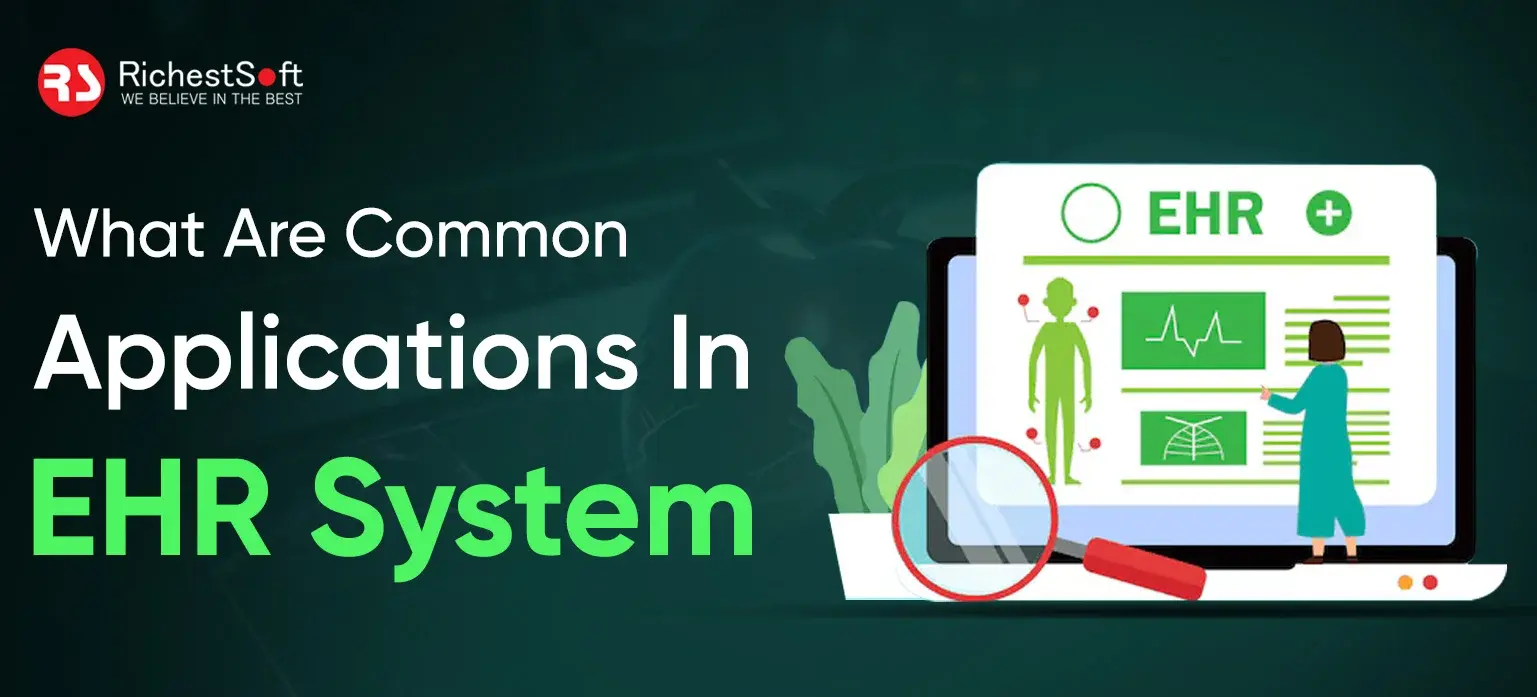December 31, 2025
Healthcare is a leading industry known for its continuous evolution and digital transformations, whether to maximize business efficiency or improve patient care. One such evolution is the industry’s advancement of EHR (electronic health record) systems.
The global EHR market is projected to surpass $40 billion in revenue by 2027, reflecting its immense growth potential. This prediction persuades medical practitioners to invest in EHR systems for future opportunities. Also, EHR systems have gained tremendous popularity due to several applications discussed in this blog. Let’s explore-
What Are EHR Systems?
EHR systems in the healthcare sector store patients’ health records in digital formats. These records often contain details such as diagnosis, medicines prescribed, disease history, laboratory test results, progress notes, and vaccination information.
EHR software helps healthcare professionals collaborate. It reduces medical errors, stores patient records, and makes accessing patient information easier. Thus, it improves patient experiences and prevents mistakes like missing medical histories or harmful drug interactions.
Common Applications In An EHR System
EHR systems store patient data securely in digital format and have various roles in healthcare, such as supporting clinical care, reporting, research, and administrative tasks. Discover more about EHR applications here-
Clinical Application of EHR in Healthcare System
EHR systems help healthcare providers manage patient data more efficiently. They help store and organize medical information like imaging results, panel tests, and medical history. This improves your healthcare system workflow, reducing errors and boosting productivity. A secure EHR allows authorized staff, such as doctors, nurses, and pharmacists, to monitor clinic data and monitor patients’ records accordingly seamlessly.
Research Application of EHR in Healthcare System
Research is the next key area in which EHRs have played a huge role. Biomedical informatics relies on in-depth research using digital records to track and gather information. Professionals use EHR data to get everything on one platform, making data collection easier and less dependent on paper records. This saves them time and effort in manually pulling data from paper files.
Administrative Application of EHR in Healthcare System
Professionals use EHR systems strategically in the administrative areas of healthcare, such as patient admittance, in/out procedures, and visits. This makes the healthcare system more efficient and provides real-time services to patients. Patients’ recorded information in the healthcare system enables quick and accurate insurance eligibility checks. EHRs benefit healthcare administrators and patients by enhancing access to healthcare, speeding up payments, and reducing paperwork. In fact, they provide insights into diseases, severity, and resource use, helping administrators manage costs and enhance overall healthcare efficiency.
EHR Application in Healthcare Financing
Another very popular application of EHR systems in the healthcare department is financing. It is specifically for the federal healthcare reform that balances access, costs, and healthcare quality. Although inspired by the adoption of cost accounting systems in other industries, the healthcare industry has also widely adapted these systems to meet specific requirements.
Application Of EHR In Health System Reporting
EHR systems have been valuable in reporting and managing patient health information. Healthcare professionals with patient data reporting requirements use the system to improve quality. Compared to manually extracted patient data with major errors, EHR systems standardize reporting by organizing and formatting data to meet the requirements of various healthcare reports. Clinical data in electronic readable form reduces the workloads, costs, and effort spent manually extracting data, lowering errors and improving the reporting quality used for healthcare decision-making.
EHR System Benefits in the Healthcare Practices
EHR systems are an excellent way to empower clinicians in their work. Entrepreneurs investing in these systems should understand their transformative impact and the specific audiences they will affect. These systems provide numerous benefits to modern healthcare practices, addressing the needs of healthcare providers, front desk administrators, IT personnel, practice leadership, and patients. Let’s explore these benefits in more detail.
Accurate Patient Medical Records
EHR systems are designed to give patients control over their medical data, ensuring secure and easy access when needed. These systems enable patients and healthcare practitioners to track vital medical information, such as diagnoses, progress, and medical history, empowering informed decisions regarding medical care. With EHR systems, healthcare professionals can securely share updates about patient health, ensuring efficient and effective care.
Timely Informs Workforce And Patients
Busy schedules often mean healthcare professionals miss appointment reminders or lab results updates. However, EHR systems address this by automating alerts and tracking features for small healthcare tasks and essential updates. The EHR system organizes everything, whether a chronic patient’s test report or annual recovery updates. Unlike manually entered updates, which can often lead to errors, EHR systems provide timely and accurate information to patients.
Quicker Documentation
An obvious benefit of EHR systems is quicker documentation. Both doctors and patients sometimes struggle to note everything during limited-time consultations. Incomplete patient information can jeopardize patient care and a practitioner’s business, even leading to billing and insurance issues that affect revenue and profitability. EHR systems solve this problem by allowing doctors to take notes during consultations. This reduces errors, speeds up documentation, and ensures accurate records without wasting extra time.
Better Communication Capability
Communication is key to effective patient care, and EHR systems significantly enhance this aspect of healthcare. These systems provide a secure platform for patients and healthcare professionals to interact, fostering a sense of connection and engagement. By enabling the accurate sharing of patient health information, EHR systems enhance the patient experience and improve decision-making processes.
Enhances Revenue System
EHR systems can boost healthcare business profitability by streamlining billing and avoiding revenue losses. These systems simplify payment collection and improve medical billing efficiency, reducing reimbursement process delays. By allowing providers to enter payment details in advance during patient encounters, EHR systems ensure sustainable revenue and enhanced productivity, all while supporting high-quality care.
Dictate Notes
It can be challenging for professionals to capture every detail of a patient’s data, but EHR systems help address this issue. These systems improve the efficiency of summarizing patient medical information by allowing practitioners to dictate important notes during consultations. Professionals can also edit patients’ records based on diagnoses and treatments, making consultations smoother and more effective.
Secure Access To Patient’s Non-Medical Data
Healthcare professionals often need access to patients’ non-medical information for billing and insurance formalities. Traditional manual methods of recording this information can lead to risks, including loss or theft, which can be a concern for security-conscious patients. EHR systems address these concerns by securely storing non-medical information and ensuring practitioners can access it whenever needed.
Applications Types for EHR System
Understanding the different types of EHR systems and their intended purposes is crucial for entrepreneurs in the healthcare industry. These systems come in various forms, each serving a specific function. Let’s explore them in detail:
On-Premise EHR Software
On-premise EHR or server-based systems are a strong investment for entrepreneurs. These systems allow healthcare organizations to host all EHR data on their servers, giving them complete control and ensuring high levels of security for patient data.
Custom EHR
Custom EHR applications cater to organizations with unique workflows or specialized requirements. Entrepreneurs can tap into niche markets by developing tailored EHR solutions for specific medical practices. These customized apps provide opportunities for higher pricing, increased client loyalty, and more personalized service.
SaaS EHR
SaaS EHR systems rely on subscription-based, cloud-based models. They are perfect for small clinics and companies looking for accessible and reasonably priced healthcare solutions. Entrepreneurs benefit from the ability to reach a large audience without regard to geography.
Standalone EHRs
Standalone EHR systems emphasize solely patient record management, making them ideal for smaller clinics and independent practitioners. Entrepreneurs can position these systems as simple, easy-to-use solutions for efficiently organizing patient information.
Practice Management EHRs
Such EHRs feature patient record-keeping with administrative functions, leading to flawless operations. Investing in them addresses major issues, such as timely billing, hassle-free scheduling, and authentic reporting on a single dashboard.
Ambulatory EHRs
Ambulatory EHRs are useful for primary care settings, specialty clinics, outpatient clinics, and hospitals. Developing them is a crucial breakthrough in contemporary healthcare practices, as they enhance patient happiness, healthcare delivery, and operational inefficiencies.
Hospital EHRs
Entrepreneurs looking to invest in this area can target hospitals seeking robust platforms to manage patient records, diagnostics, and workflows. These systems serve large user bases and offer opportunities for recurring revenue through licensing and updates.
Long-term & Post-Acute Care EHRs
Long-term care EHRs track the patients’ medical requirements in extended-care facilities. Patients rely on these systems with chronic illnesses or those recuperating from physical, mental, or behavioral disorders.
Behavioral Health EHRs
Medical practitioners use behavioral health EHRs to exchange data safely with patients via remote telehealth meetings. These EHRs have great features, so it’s important to include and experience them for the best experience.
EHR App Development
Before developing an EHR system, define a realistic budget. The cost can vary significantly, depending on the type of system, business model, and additional features required.
It is important to consult with a reputable electronic medical records software development company to create a strategic approach for your healthcare app development cost.
Below are the tables outlining the key expenses for EHR software development-
| Development Phase | Estimated Cost (in $) |
| Requirement Analysis & Planning | 5,000 – 10,000 |
| UI/UX Design | 7,000 – 15,000 |
| Backend Development | 20,000 – 50,000 |
| Frontend Development | 15,000 – 30,000 |
| Database Design & Integration | 10,000 – 20,000 |
| Feature Implementation | 30,000 – 60,000 |
| Testing & Quality Assurance | 8,000 – 15,000 |
| Deployment | 5,000 – 10,000 |
| Maintenance & Updates | 5,000 – 15,000 per year |
Note: The cost of developing an EHR system can range between $10,000 and $300,000.
RichestSoft’s Expertise In App Development for EHR App development
Partnering with RichestSoft offers a transformative opportunity to excel in the healthcare industry. We create advanced EHR solutions and provide AI integration services that harness cutting-edge technology to deliver exceptional benefits.
RichestSoft has the right blend of skills and technology understanding. Our capability helps entrepreneurs get and implement efficient EHR systems in healthcare that are more secure and sustainable.
So, don’t wait—connect with us today and take your healthcare solutions to the next level!
Conclusion
EHR systems ensure secure data handling and have the potential to enhance healthcare outcomes. However, implementing and launching EHRs is a complex process that requires organization-wide readiness and acceptance.
Healthcare providers need a solid transition plan to maximize the benefits of electronic health records. This plan includes selecting a reliable healthcare app development company with 24/7 tech support.
These systems have been desirable topics in the sector because they can improve the accessibility of health information for patients and providers.
The global EHR market is projected to surpass $40 billion in revenue by 2027, reflecting its immense growth potential. This prediction is something to remember when medical practitioners aim to enhance their revenue graph. Also, EHR systems have gained tremendous popularity due to several applications discussed in this blog.
 +1 315 210 4488
+1 315 210 4488 +91 99888 06489
+91 99888 06489






